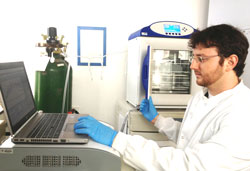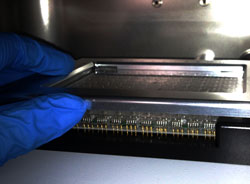The xCELLigence Real Time Cell Analyser
News category: Nanotech
 Adam Kramer, a Masters student in Biotechnology at Rhodes University uses the xCELLigence RTCA system to study cellular differentiation. Photograph by Janice Limson
Adam Kramer, a Masters student in Biotechnology at Rhodes University uses the xCELLigence RTCA system to study cellular differentiation. Photograph by Janice Limson
For scientists trying to study how cells respond to different drugs, different conditions or even viruses, perhaps the biggest challenge is getting information in real time during cell culture experiments rather than just at the end of the experiment. Here the xCELLigence Real Time Cell Analyser deserves its gold star.
Cell culture experiments are the norm in most biochemical laboratories, serving as model biological systems for experimentation. In traditional experiments cells are treated with a test compound and after a set time are analysed using a variety of techniques. These so-called ‘end-point’ assays are limited in that they only give information to the scientist at one point – the end of the experiment. But what has happened to the cell until that point, during the experiment?
The xCELLigence Real Time Cell Analyser may well be a solution, making use of the electrical properties of cells to monitor their growth, death and morphology. Cells are grown in gold-coated cell culture dishes which connect directly to the xCELLigence monitoring station. A current passes through the gold and as the cells settle and grow on the surface, the resulting electrical impedance (the amount of opposition a current experiences as it passes through a conductor) is measured by the system, in real time. As cells attach to the gold surface and grow, the impedance experienced by the passing current increases. This measurement is used to calculate the ‘Cell Index (CI)’ at a particular time point. These impedance measurements are used then to create a Cell Index versus Time curve, representing how the cells are growing.
At Rhodes University the xCELLigence, part of an NNEP funded suite of molecular biology tools, is providing critical and real time information on processes of stem cell differentiation, the effect of novel drugs on cancer cells and how viruses infect their host cells. For more information and usage, email: bmb@ru.ac.za
Writer: Adam Kramer

The xCELLigence RTCA system used to study cellular differentiation. Photograph by Janice Limson
